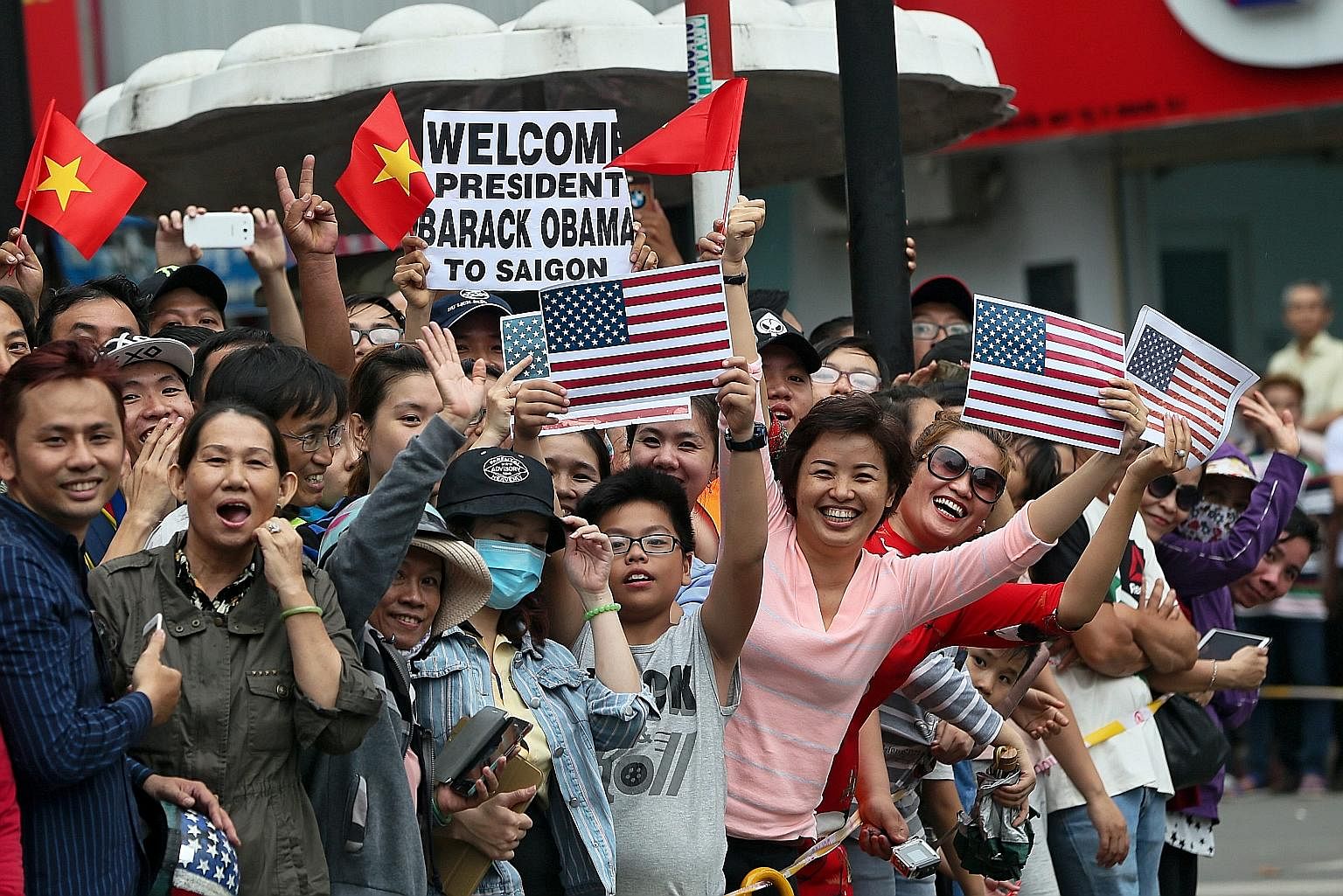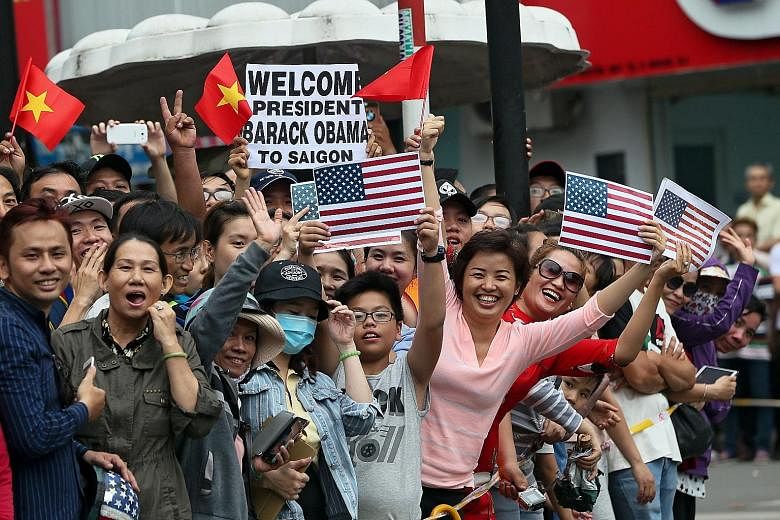Now that the glitter over United States President Barack Obama's visit to Vietnam last month is settling down, it is time to consider what meaning his trip has for the strategic situation in the region.
First, Mr Obama's visit is a clear signal that both sides wish to be closer friends, an intimacy that could worry China. Mr Obama declares that the complete lifting of the arms embargo on Vietnam does not target China but is for Vietnam's self-defence. Against who, it may be asked, and the answers reverberate in everyone's head. The audience warmly applauded Mr Obama when he spoke in a public lecture that "no other nation can impose its will on you or decide your destiny". Following that naturally is Mr Obama's assurance to his host that America does not wish to impose its form of government.
America's courting of Vietnam stretches into the socio-economic field. There were many bilateral business deals and assistance agreements in the fields of high technology, clean energy, climate change, environmental protection and education. The star deal was VietJet Air's commitment to buy 100 jets from Boeing. The US Peace Corps will teach English in Vietnam, and US universities will be opening more branches and facilities.
But there is no deal bigger than the US commitment to keep Vietnam in the Trans-Pacific Partnership (TPP). While the TPP can be seen as a US counter to Chinese influence, the Vietnamese motivation is to use the wider access to US markets and investments to power its economy. There is wide consensus in Vietnam that economic success will create greater capability in protecting its national sovereignty in the South China Sea, the theatre of a series of overlapping claims with neighbouring countries, especially China. The US is now the biggest export market for Vietnam, and US companies will be encouraged even more by the success of the visit to invest.
Mr Obama was the third consecutive president of the US to visit Vietnam after the end of the Cold War. It means that US foreign policy sees Vietnam as a priority destination and one that the US president should include in his travel schedule. Yet, all three presidents visited Vietnam only in their second term, which also basically implies that Vietnam is not of the highest priority.
Nor have we heard or seen during the Obama visit any verbal, or even any, hint of a deeper or larger commitment by the US to the defence of Vietnam. The US has said it takes no side on South China Sea matters, and that remains unchanged.

The lethal arms embargo is in principle lifted but offers to sell lethal arms will still have to meet human rights criteria, which have not been specified. And human rights and democracy activists in Vietnam are still having a hard time, which will not change in the short term.
Whether US-Vietnam relations will grow even stronger beyond the socio-economic fields will, to a large extent, depend on what China does. Chinese strategy towards Vietnam continues to be two-pronged - hard-nosed on the South China Sea, and through strategic persuasions to prevent an immediate Vietnamese pivot.
Vietnam remains a strong challenger against Chinese strategic objectives in the South China Sea, given the huge number of islands Vietnam occupies, as well as possible stronger Vietnamese cooperation with the US, Japan and the Philippines in the maritime defence domains.
Strategically, China explicitly courts Vietnam through an emphasis on their political similarities and historical comradeship, in particular pointing out that the survival of their communist regimes partly depends on their continuing good relationship to unite against capitalist governments' attempts to overthrow communist party regimes.
Implicit in all its lures is the hard fact that this large neighbour is now militarily much stronger and can turn unfriendly and aggressive again - as it did in the brief China-Vietnam war in 1979. War with China on the mainland is the last thing Vietnam wants.
China's soft power over Vietnam has much catching-up to do, compared with that of the US. Trade between Vietnam and the US increased 150 per cent over the last decade, while Vietnam continues having a huge trade deficit with China. The US is the top educational and migration destination for Vietnamese, while far fewer Vietnamese wish to study or live in China. In a show of US soft power, Vietnamese lined the streets of both Hanoi and Ho Chi Minh City to welcome the US President. Chinese presidential visits have never received such a spontaneous welcome.
In conclusion, the Obama visit has sharpened the focus on a possible Vietnamese pivot towards the US. Strong and deep mutual economic interests can make friends commit to each other's defence.
In reality, such a pivot is useful to the Vietnamese only if strategic assumptions are altered dramatically and fundamentally. These assumptions would include a sea change in the China-Vietnam relationship, and further losses of Vietnamese islands. A Chinese attack on Vietnam on land is not likely and not foreseen, but an incursion or conflict in the South China Sea cannot be ruled out totally.
For now, it is likely that only further Vietnamese losses in the South China Sea would lead to a Vietnam-US alliance. If its actions push Vietnam closer to the US, China would in effect be creating another US military alliance on its doorstep, in addition to the US alliances with Japan, South Korea and the Philippines. By then, a presumptive US strategic encirclement of China in East Asia would be complete.
In the meantime, it remains fair game for both the US and Vietnam to hint at the possibility of a pivot.
•The writer is founder and director of consultant firm David Koh & Associates and is a long-time analyst of Vietnam and South-east Asia.

